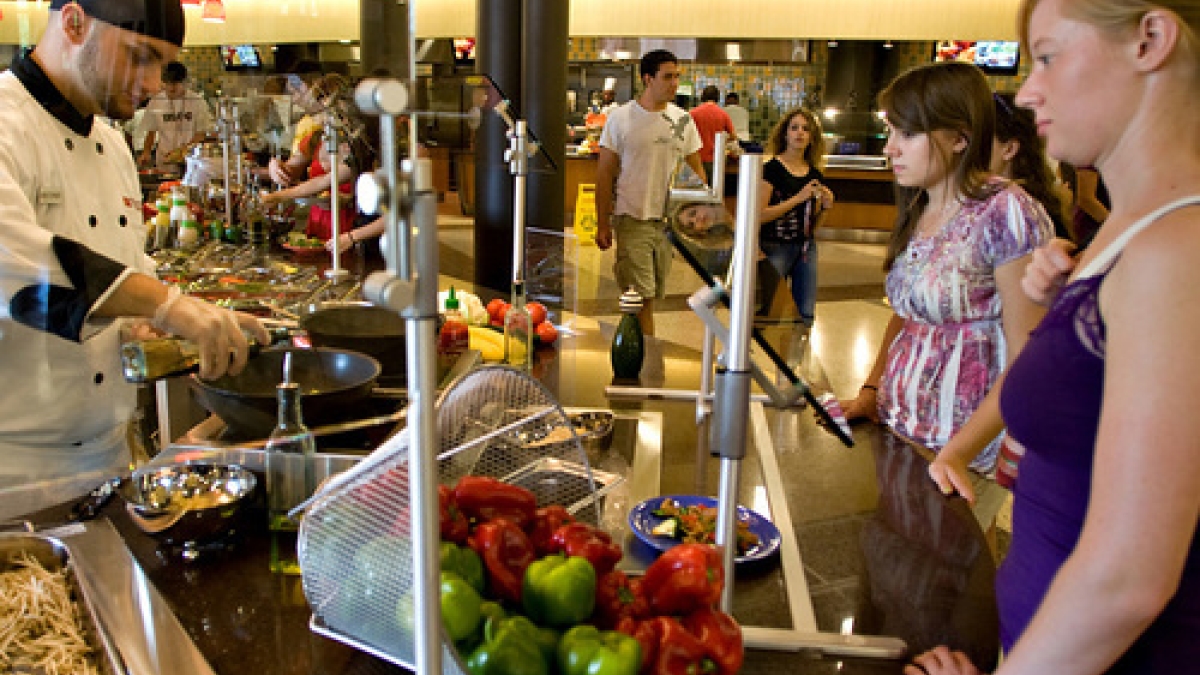ASU, partners commit to be a fair trade-designated university

Chantel Lawrence (right) and Tracie Smith have a stir fry prepared just for them in the Barrett Honors College dining facility.
Arizona State University President Michael Crow sent an open letter on March 28 to the ASU community committing ASU to be the largest fair trade university in the U.S. The commitment is in partnership with Aramark and Follett.
Fair trade-certified products are produced with fair labor practices and environmental protections. ASU joins 47 other universities and 533 university retailers that pledge to provide fair trade food items like coffee, tea, chocolate and other products including textiles.
As part of the commitment, the following locations must provide at least two fair trade food options:
• Aramark
• Atlasta
• Sun Devil Campus Stores
• Sun Devil Dining
Participating vendors must provide signage and education about fair trade certified products. Aramark already provides fair trade resources when it caters campus events.
“This designation demonstrates institutional commitment to fair labor, global connection and supporting student initiatives,” said Nichol Luoma, University Business Services associate vice president and chief sustainability officer. “It furthers the university’s sustainable procurement policies and procedures.”
ASU School of Sustainability graduate student and Aramark intern Hannah Trigg invested three months in drafting the fair trade commitment and implementing most of its provisions, and then partnered with University Sustainability Practices for the final steps in securing the commitment. Biological sciences junior Daniella Simari continues to lead tabling events, education and outreach.
Four ASU students will attend a national conference and showcase fai trade innovations in late March. They also plan to host a lecture about fair trade clothing in partnership with The Fabric Studio and the ASU Global Institute of Sustainability on April 27.
Campaign organizer and Japanese senior Sydney Williamson connects the ASU community to parts of the world most affected by fair trade practices. The campaign asked students to write Valentine’s Day cards to farmers in Ecuador, Ghana and Philippines. In April, Asian Pacific Heritage month, the campaign will bring more awareness to tea grown in Asia and India.
“We’ve seen these events excite both international students and U.S.-born students,” she said. “It’s a powerful way to humanize the issue of fair trade.”
Students can further the university’s commitment to food reconnection when they purchase fair trade products. When employees purchase fair trade food, they can earn points on a green office or event certification.
“The university’s food reconnection goal includes re-establishing a strong relationship with nutritional food and where it comes from,” said Mick Dalrymple, university sustainability practices director. “When we buy fair trade, we’re closer to knowing our food’s sources and impacts on other people and the health of our planet.”
Learn more about ASU’s food reconnection goal. Learn about how to become involved in collaborative sustainability action on campus.
More Environment and sustainability

ASU to host new Global Coordination Hub
In a new partnership between the global research network Future Earth and Arizona State University, the Julie Ann…

A world full of plastic ... not fantastic
Editor’s note: This is the seventh story in a series exploring how ASU is changing the way the world solves problems.…

Team wins $10M XPRIZE Rainforest competition for novel solution
Several Arizona State University experts are on a team that created a new way to put a price on the rainforest in order to save…